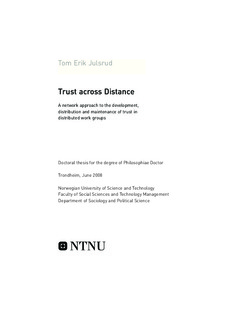| dc.contributor.author | Julsrud, Tom Erik | nb_NO |
| dc.date.accessioned | 2014-12-19T14:34:55Z | |
| dc.date.available | 2014-12-19T14:34:55Z | |
| dc.date.created | 2008-06-24 | nb_NO |
| dc.date.issued | 2008 | nb_NO |
| dc.identifier | 124542 | nb_NO |
| dc.identifier.isbn | 978-82-471-1087-4 | nb_NO |
| dc.identifier.uri | http://hdl.handle.net/11250/268069 | |
| dc.description.abstract | Work groups that consist of members localized in different geographical places, but maintain contact via electronic media, have become a widespread phenomenon within modern organizations. These are generally referred to as distributed work groups. Trust is increasingly considered to be a key characteristic for distributed groups, which can help improve the quality of the work, increase the effectiveness of the group, and prevent conflicts. At the same time, trust is a characteristic that can be difficult to develop within the frameworks where such groups often operate. This dissertation examines the opportunities that exist for such groups to establish and preserve trust, using an empirical study of four cases linked to an international Norwegian company as its basis. The dissertation builds upon a network-based analytical perspective, in which the distributed groups are understood to be dynamic relational networks, supported by different types of information and communication technologies (ICT). In accordance with this perspective, trust is primarily understood to be a characteristic of the social relations that exist within the groups, and a quality of the structural configurations of trust-bearing networks. In this field, the network perspective opens up for more detailed analyses than what has previously been done, with greater focus on the “structural aspects” of trust.
The dissertation explores three main processes linked to the following: 1) establishing trust within distributed groups; 2) the distribution of trust in relation to ICT-based communication; and 3) the significance of structural configurations for preserving trust within groups. The results indicate first that trust in groups is established and reinforced in situations where certain coworkers actively build trust over geographical and cultural barriers. These relational processes are described in the dissertation as trust brokering. Trust brokering involves a gradual building up of trust relations through regular interactions, and it can be developed along a cognitive and an affective dimension. Second, the results demonstrate that affective and cognitive trust networks follow different structural patterns within the groups, and they are supported by different types of ICT; while the affective networks are especially supported by face-to-face communication and text messages, the cognitive networks are especially supported by voice telephony and email. This indicates that the quality of the social relations affects what technology is used to initiate or maintain a relation. Third, the results reveal that the groups with high levels of group-based trust have developed integrated cores consisting of trust-bearing relations, involving key actors in the group. This suggests that the groups’ structural configuration of trust-bearing relations influence on how well trust is developed and maintained in these cases. | nb_NO |
| dc.language | eng | nb_NO |
| dc.publisher | Fakultet for samfunnsvitenskap og teknologiledelse | nb_NO |
| dc.relation.ispartofseries | Doktoravhandlinger ved NTNU, 1503-8181; 2008:202 | nb_NO |
| dc.relation.haspart | Julsrud, Tom Erik; Schiefloe, Per M. The development, distribution and maintenance of trust in distributed work groups: a social network approach. International Journal of Networking and Virtual Organisations. 4(4): 351-368, 2007. | nb_NO |
| dc.relation.haspart | Julsrud, Tom Erik; Bakke, John W. Building trust in networked environments: Understanding the importance of trust brokers. Computer-mediated Relationships and Trust: - Organizational and Managerial Effects: 117-138, 2007. | nb_NO |
| dc.relation.haspart | Julsrud, Tom Erik. Flows, bridges and brokers: exploring the development of trust relations in a distributed work group. International Journal of Networking and Virtual Organisations. 5(1): 83-102, 2008. | nb_NO |
| dc.relation.haspart | Julsrud, Tom Erik; Bakke, John Willy. Trust, friendship and expertise: The use of email, mobile dialogues and SMS to develop and sustain social relations in a distributed work group. The mobile communications research annual: - The reconstruction of space and time through mobile communication practices, 2008. | nb_NO |
| dc.relation.haspart | Julsrud, Tom Erik; Bakke, John W. Interpersonal trust and mobile communication: A social network approach. Trust and New Technologies: - Marketing and Management on the Internet and Mobile Media, 2008. | nb_NO |
| dc.relation.haspart | Julsrud, Tom Erik. Core/periphery Structures and Trust in Distributed Work Groups: A comparative case study. Structure and Dynamics: eJournal of Anthropological and Related Sciences. 2(2), 2007. | nb_NO |
| dc.title | Trust across Distance: A network approach to the development, distribution and maintenance of trust in distributed work groups | nb_NO |
| dc.type | Doctoral thesis | nb_NO |
| dc.contributor.department | Norges teknisk-naturvitenskapelige universitet, Fakultet for samfunnsvitenskap og teknologiledelse, Institutt for sosiologi og statsvitenskap | nb_NO |
| dc.description.degree | PhD i sosiologi | nb_NO |
| dc.description.degree | PhD in Sociology | en_GB |
